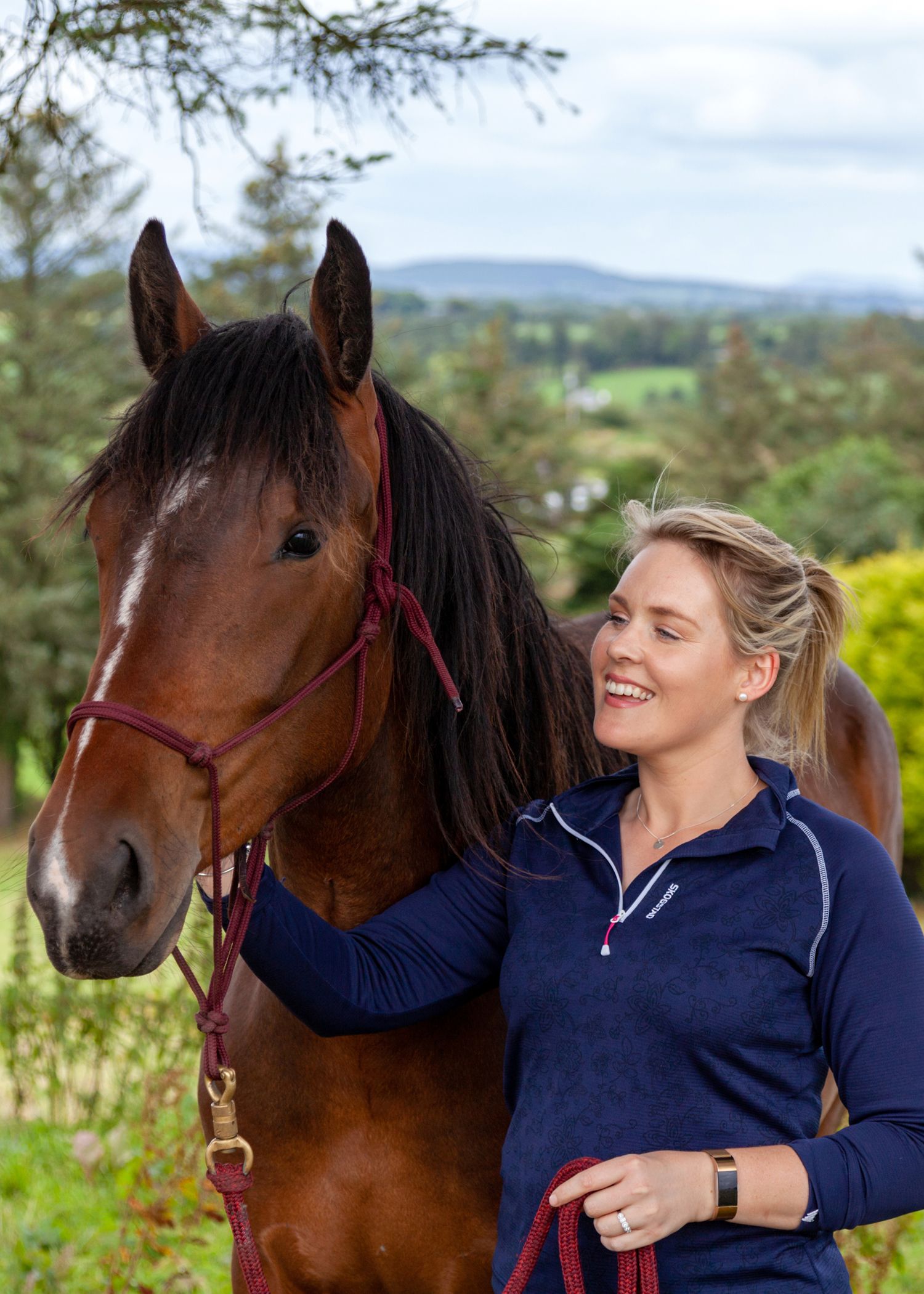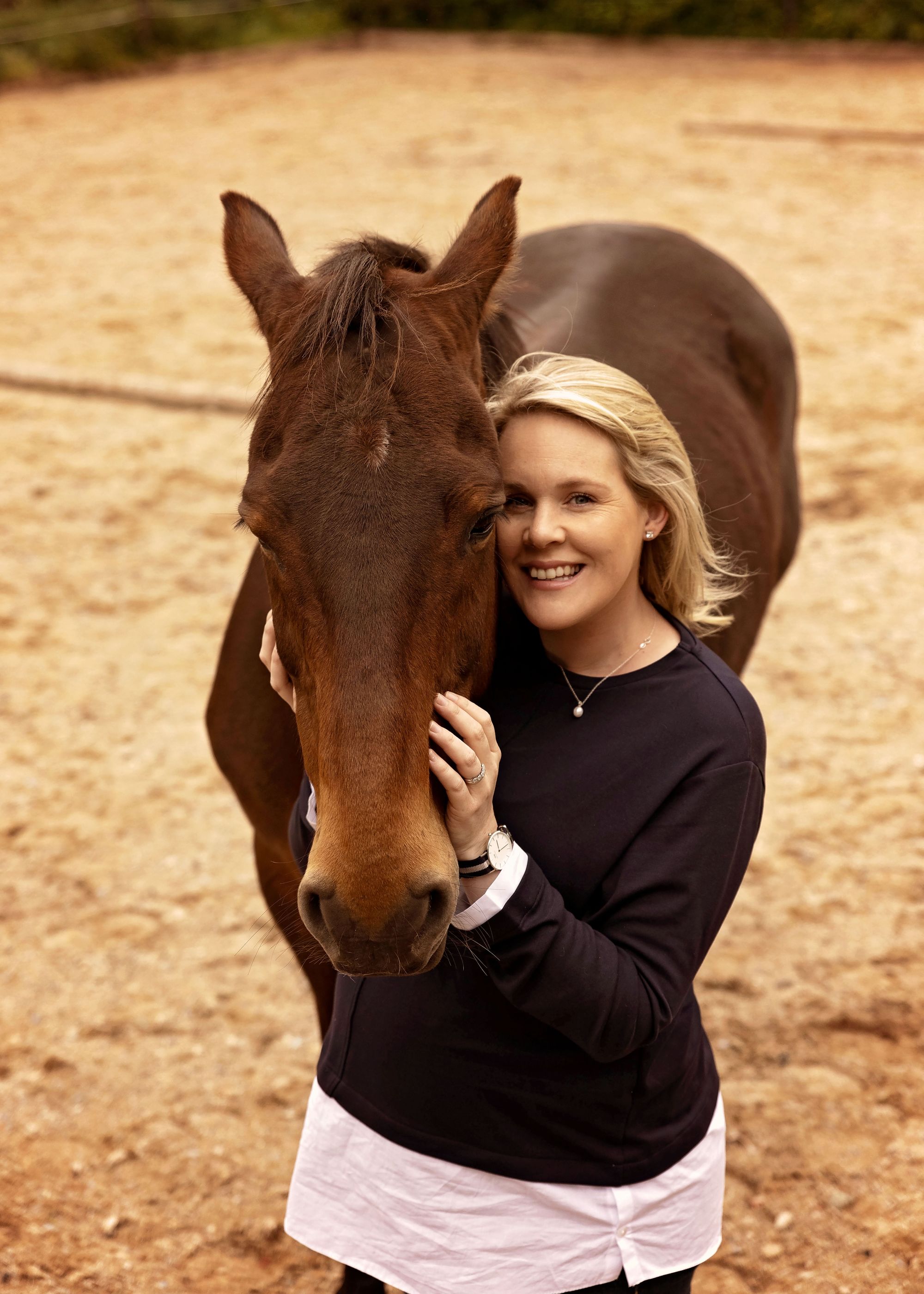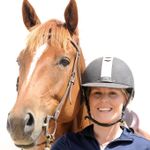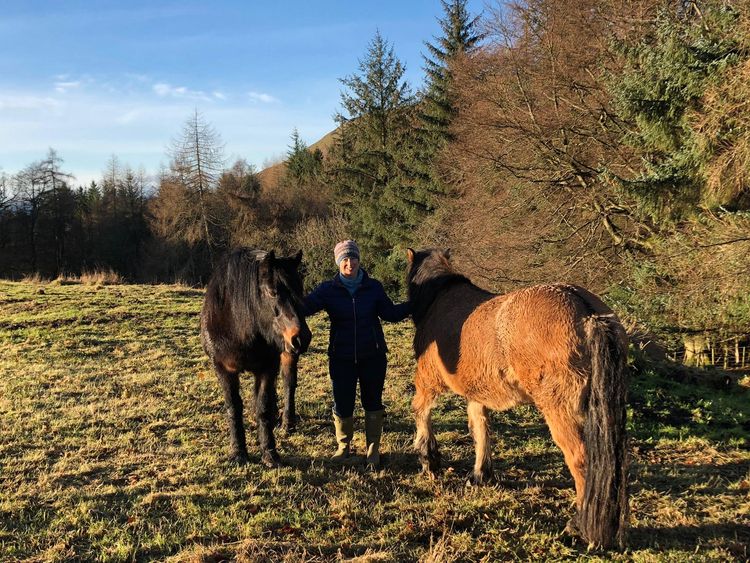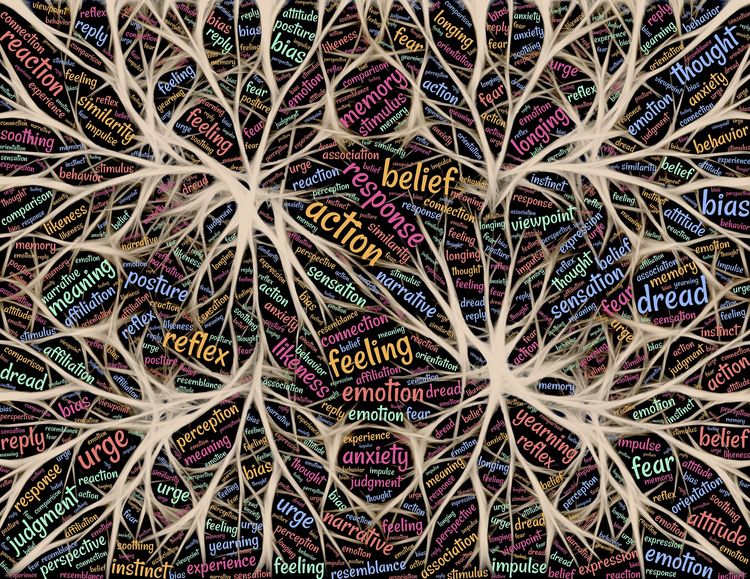Perfectly Paused? – The Equestrian Edit
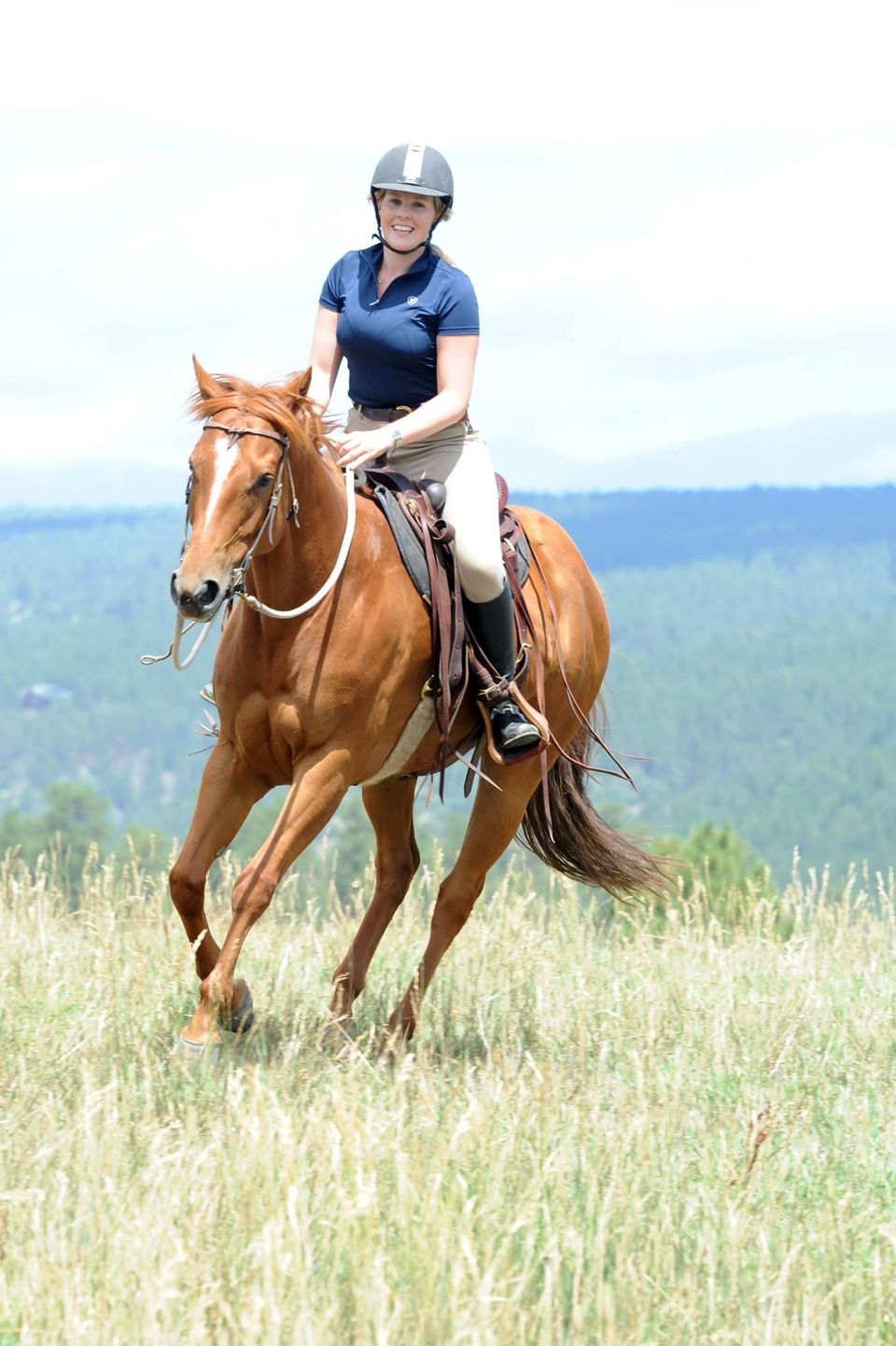
The problem is not slipping up; the problem is thinking that if you can’t do something perfectly, then you shouldn’t do it at all.’ - James Clear
We all want to get it right or even ‘perfect’ in life, in our careers and, most importantly, with our horses. From a young age, we are socially conditioned to strive to get it right & we swell up with pride when we are told that we have done something ‘perfectly’. I am guilty of saying this myself in my teaching & mentoring roles, but realistically, being perfect is an exhausting & self-destructive endeavour.
There is no such thing as perfect, it is an impossible standard. Perfectionism affects all genders, but studies have revealed that women often suffer more when it comes to perfectionism. Women have been found to hold back in comparison to their male counterparts in terms of seeking job promotion & new opportunities. Women holding back or not putting themselves forward has been put down to self-reported lack of experience, skill or worthiness, even though on paper women may be equally or more qualified than their male colleagues that successfully secure promotions & growth opportunities.
Having watched the Tokyo Olympics across a range of sporting disciplines, I saw many athletes shaking their heads after their performance, but many still went on to secure a gold medal. Winning a gold medal does not necessarily mean a performance was perfect or flawless. What it means is that the winning athlete was the best on the day & most probably performed to an incredibly high standard. There most probably were flaws that the athlete was aware of, yet despite these errors, their performance still had the capacity to be highly inspirational to those watching.
Furthermore, the inception of the internet has also created a petri dish in which the need for perfectionism can grow exponentially. Putting our equestrian lives out there takes courage in the face of judgement & criticism. In a modern equestrian context, social media can portray exacting standards & ideals that seem unattainable, this coupled with the criticism that has become part & parcel of online interaction can create a perfectionism trap that cripples us so badly we become paralysed in our horsemanship. By attempting to be perfect, we are trying to minimise criticism, blame & ridicule (Brown, 2020). Most people are trying to do the best they can, so we need to be kind & compassionate in our interactions with others in our equestrian communities.
When we strive for perfection, we place undue pressure on ourselves and our horses. As equestrians we have the advantage and disadvantage of working with a live being that instantly picks up on our mood and energy, that’s why it is beneficial to delve into how we perceive ourselves & our mindset away from our horses.
Perfectionism Vs. Healthy Striving
What happens if you want to be great, but you’re not supposed to be a perfectionist?
Perfectionism & excellence are distinctly different from one another. Perfectionism tends to be focused on what other people think, whereas excellence or healthy achievement tends to be more internally focusing, improving on our own past performances & doing our best.
The quest for perfectionism can have a negative impact on our progress & development. When we feel we were not perfect enough, we strive to be more perfect & flawless the next time. This draws us away from improvement. We can find ourselves avoiding certain horsemanship experiences where we might fail & only engage in activities that we can excel at (Neenan, 2018). This may seem like a good strategy on paper, but this approach can leave us stuck in our horsemanship, we can be threading water (albeit very well), but we may not be pushing out into the deep where we are challenged & new skills are required.
As instructors, coaches, & students, we role model for others how we deal with challenges. We are all co-creating a culture of tolerance or intolerance, compassion or criticism.
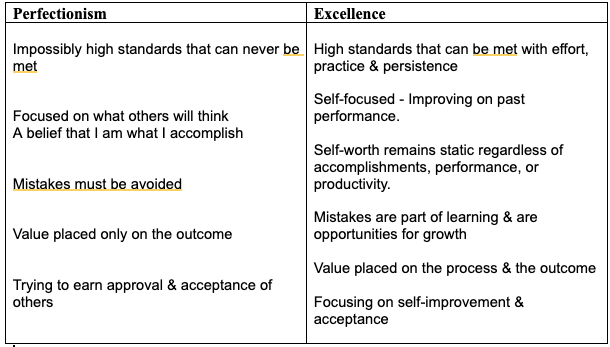
Perfectionism & Procrastination
If procrastination is the thief of time, perfectionism is its partner in crime. When everything has to be perfect, we tend to put things off;
When I lose 10lbs I will have a photo shoot with my horse
When we are cantering under saddle, I will sign up for the clinic
When my horse is better at laterals, I will enter a show
When I can ride perfectly on the beach, we will plan a trip (or maybe you could just go & do ground work until it’s safe to ride on the beach)
When we strive for the impossible standard of perfectionism, weeks, months & years can elapse. The time passes and we realise our horses and ourselves are older, but still clutching onto getting things perfect & when they are we will be able to do X, Y & Z, this may be the case, but it may also never happen. This life paralysis (Brown, 2010) can so easily get a hold on our equestrian endeavors, we end up missing out on opportunities because we are too afraid to put anything out to the world that could be imperfect.
We all know that post-clinic feeling where you admire your horse in the field for two weeks, because you don’t want to shatter the post-clinic glow of achievement where everything went so well. This time off can be wonderful for soakage time & integration of that all-important learning, but when the time comes to re-engage with your horse remember to leave your perfectionism pants in the house, it’s probably going to be a little back of where it was at the clinic, but neither you nor your horse are going to dissolve because it’s not perfect.
All of these equestrian experiences are easier to deal with when we know the ‘why’ & we have insight & awareness into our behaviours. Take a deep breath & remind yourself it doesn’t have to be perfect & get back out there.
One of My Many Equestrian Brushes with Perfectionism
A few years back I was at a clinic with one of my horses, it was a clinic I had really been looking forward to & had done lots of preparation work to be ‘clinic ready’. In the second session on day 2 I had planned to ride & get some instruction on some lateral movements I had been practising. However, my horse was finding it very difficult to find a standstill for mounting, in that moment I knew exactly what I had to do, put the relationship first & help my horse to feel calm & connected so that he was happy for me to get on. I knew this was absolutely the right thing to do, but I also couldn’t help but feel embarrassed & ashamed that things were not better & I felt quite self-conscious about it. I wanted things to be perfect & really felt the sting of them falling short of my self-imposed standard.
I spent the session getting the mounting to a good place; I rode him for a few minutes and called it a day, knowing that both my horse & I had done a good job & put our relationship first, but the glare of an audience & my supposed inability to even get on my horse was still rolling around in the back of my head. After the session, one of the spectators came up to me & said she really enjoyed watching me & my horse & that she was working on the same thing with her own horse. She went on to book a lesson with me as a result of our inadvertent mounting demonstration. I was really taken aback by how falling short of my own perception of what I wanted to happen had ended positively for me, the horse & the spectator.
The experience taught me the following;
It’s always pays to put the relationship with yourself & your horse first
Just because something doesn’t go perfectly, doesn’t mean all is lost, mentally shout ‘Plot Twist’ & roll with it.
You never know the influence your actions can have
Challenging situations are wonderful teachers
Overcoming Perfectionism
We need to build resilience to the shame we feel when we don’t carry out something perfectly, we can firstly do this by reminding ourselves that perfectionism is an illusion & soothe ourselves with affirmations reminding ourselves of our worth & value. Self-compassion is the antidote to perfectionism. We also need to surround ourselves with compassionate individuals that help us achieve excellence by supporting us in a positive & uplifting manner.
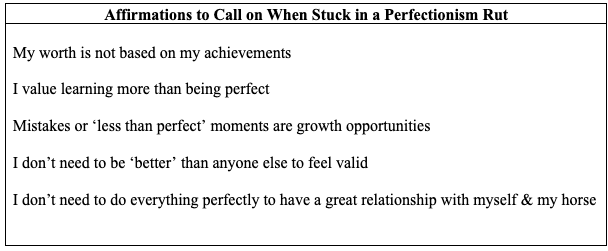
Life with our horses is short, your six-year-old horse is suddenly fourteen & the hopes, dreams & aspirations you started out with may still be on the ‘To Do’ list, so make sure the need for perfectionism isn’t holding you back. Book the clinic, photo shoot, organise the beach trip & do it on your terms & at your pace.
I will leave you with the words of Voltaire;
‘Don’t let perfection be the enemy of good.’
References
Brown, B. (2020) ‘The Gifts if Imperfection’ New York, Random House.Neenam, M. (2018) ‘Developing Resilience’ London, Routledge.
